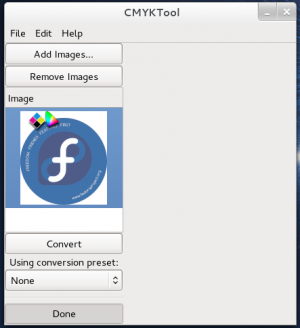🔗 I don't want to read (TLDR). What do I need to know?
- CMYK is for printing.
- RGB is not for printing. Don't send RGB files to print shops / vendors - they will come out bad.
- Before sending it to the printer, you should check if your files are CMYK or RGB. Instructions on how to check
- If you have a file to send to a printer but it's RGB, convert it to CMYK following these instructions.
🔗 What's wrong with this picture?
Did you notice that the Fedora 7 disc and the Fedora 16 sleeve are looking at little... purple? Not the Fedora blue we are used to? Further, did you notice the fonts on the Fedora 7 disc do not match the other materials here?
The reason the items on the right came out purple is because they were printed using RGB, not CMYK. The items on the left were printed using CMYK and they came out correctly.
🔗 What is RGB? What is CMYK?
In a nutshell, they are different ways of indicating what color something should be:
- CMYK is for printing. It specifies what mix of Cyan, Magenta, Yellow, and blacK ink colors should be used in which areas of the design to be printed. If you sent anything to a professional printing company, make sure it is CMYK.
- RGB is for on-screen display and projection. It specifies, per pixel in your LCD screen, whether or not each of the Red, Green, and Blue lamps is turned on, and if it is turned on, how intense/bright it is set. If you send Fedora artwork to a printer in RGB mode, it WILL turn out purple!
In a little more detail:
RGB is a type of color model used by computer displays. It involves adding red, green, and blue light together in different combinations to form different colors. For example, adding red, green, and blue all together forms white - it is an additive color model because the more colors you add together the closer you get to white. Adding red and blue together forms magenta. Read more about RGB on Wikipedia.
CMYK is a different color model used quite often in printing processes. Rather than being an additive model like RGB, it's a subtractive color model, meaning the more colors you add together, the closer you get to black. CMYK stands for Cyan, Magenta, Yellow, and blacK, the four ink colors used to produce a range of colors.
Converting between RGB and CMYK is hard. In the past, the Fedora project has tried sending items to the printer in RGB colorspace. For Fedora 7, this resulted in CD labels that were a dark purple rather than the Fedora blue we know and love. Wait, why did this happen?
Well, some of the best graphic tools in the free & open source software world do not support CMYK color. Don't worry, there are ways around this. If you want to dive in more, there are resources listed at the end that you can use as a start to read up in more detail on color management issues.
🔗 What about Pantone®?
Pantone is a different method of color specifications. It's called a 'spot color' method, because rather than mixing 4 ink colors in different ratios to make a huge range of colors as with CMYK, Pantone sells patented inks in thousands of different ink colors, and you pay per ink color. For most Fedora printed swag, you won't need to indicate Pantone colors.
There are some cases where you'll need to indicate Pantone values. You should only ever need to indicate the following two Pantone® colors:
| Fedora Blue | Pantone® 2935 | |
| Fedora Dark Blue | Pantone® 541 |
If you cannot work this out with the printer though, please contact the Fedora design team.
🔗 How can I check if the file I have is RGB or CMYK?
Glad you asked! There's two ways you can do this, via the command line or via a nice GUI tool called CMYK Tool.
I will give you one quick trick though to know for sure if a particular file is definitely RGB and not CMYK:
If it is an SVG created by Inkscape, it is RGB, and not suitable for printing!
Really? Yes, really. Read more here.
🔗 Checking via the command line
- yum install ImageMagick
- identify -format %[colorspace] <filename>
Example output might look like this if your file is CMYK:
[duffy@pandamotor]$ identify -format %[colorspace] balloon.pdf CMYK
It would look like this if your file is RGB:
[duffy@pandamotor]$ identify -format %[colorspace] fedoraproject-org_2012.svg RGB
🔗 Checking via GUI
You will need to install a tool called CMYK Tool. The package, available in Fedora 16 onwards, is named cmyktool. You can not open PDF files in it (try the command line above for those), but you can open SVG, PNG, and JPG format images.
When you first open up cmyktool, click on the "Add Images..." button in the upper left and select the image you want to check. It should look something like this:
In the image above, there is a little red, green, and blue icon emblem in the upper-left of the image. This means the image is RGB. Here is what the same screen looks like if the image is CMYK:
In the CMYK image preview in cmyktool's screenshot above, you'll notice there's a diamond emblem icon in the upper-left of the image showing cyan, magenta, yellow, and black color swatches. This means the image is CMYK.
🔗 Oh no! The design I have for print is RGB, not CMYK! What do I do?
Ideally, you should contact the designer who created the image and ask them for a CMYK version of it or email the design-team at lists dot fedoraproject dot org mailing list. In my experience, I've found that PDF is the best file format for CMYK vector graphics; TIFF or PNG are good formats for CMYK bitmap graphics, so make sure they provide you the design in the appropriate format.
This isn't always possible though; maybe you have a very tight deadline and the designers aren't online in #fedora-design, or maybe the designer who created the file doesn't know how to convert it.
We have a How to set CMYK color on a design for printing tutorial available that you'll want to check out in this situation. It will walk you through the conversion process.
🔗 Further Reading
- Black Five Imaging - an excellent article by the makers of CMYKtool with visual explanations of how color management works
- Wikipedia article on CMYK
- Wikipedia article on RGB
- "Color management, (soft)proofing and CMYK with FLOSS" by David Revoy
- Getting CMYK colors from Inkscape to Scribus for printing from LibreGraphicsWorld
- "I found my RGB colours again" by Dennis Appelon
- "SVG Chicken and CMYK egg" by Jon Cruz



